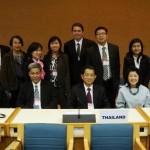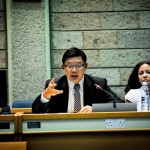Thailand participated in the recent Third session of the International Conference on Chemicals Management (ICCM3) at the United Nations Office in Nairobi, Republic of Kenya from September 17-21, 2012. The Thailand delegation was headed by Mrs.Sunee Piyapanpong, Deputy Director of Pollution Control Department and consisted of representatives from the Food and Drug Administration, Ministry of Public Health, Department of Labour Protection and Welfare, Ministry of Foreign Affairs, and from NANOTEC. Prof. Sirirurg Songsivilai, Executive Director of NANOTEC, Dr. Sirasak Teparkum, Deputy Executive Director and Dr. Lerson Tanasugarn, Head of Department of Biochemistry, Faculty of Science, Chulalongkorn University represented NANOTEC.
The organizer of ICCM3 took this opportunity to reviewed implementation progress, address emerging policy issues, considered new activities for addition to the Global Plan of Action, evaluate finance, and take strategic decisions on future activities. The rapid progress of Nanotechnology development, and increase commercialization of products containing nanomaterials have prompted ICCM3 to include the role of nanotechnology as one of its discussion topics.
On this note, Prof. Sirirurg delivered Thailand’s intervention on Nanotechnology and Manufactured Nanomaterials.
“On the issue of nanotechnology and manufactured nanomaterials, Thailand would like to thank the United Nations Institute of Training and Research or UNITAR for supporting a number of pilot projects in developing countries” said Prof. Sirirurg Songsivilai. “Thailand appreciates the opportunity to be one of the three countries chosen by the UNITAR to carry out these projects and we wish to continue our collaborative efforts with the UNITAR in striving forward the works in this important issue”.
Prof. Sirirurg went on to say that Thailand has placed great importance to the development of Nanotechnology, and manufactured nanomaterials are being used in various industries. A number of nano-enabled products are commercially available, including water repellent clothes, antimicrobial coated materials, nano-encapsulated vitamins, and nano-emulsion skin care products.
Thailand proposes playing the role of a “sub-regional hub in nanosafety and nanotechnology” to further strengthen collaboration with neighbouring countries as well as developed and developing countries in the areas of nanosafety, risk management and public awareness. “Thailand stands ready to provide regional trainings and workshops on public awareness, which we have successfully trained more than 150 certified trainers, who have subsequently disseminate the information and public awareness on nanotechnology to more than 200,000 people throughout the country” said Prof. Sirirurg. “We also stand ready to provide advice in conducting workshops on nanosafety and risk management, nano-standardization and regulations, and nanosafety guideline for factory workers, laboratory personnel, and consumers that are in line with international best practices”.
For information on ICCM and SAICM, please log on: http://www.saicm.org

